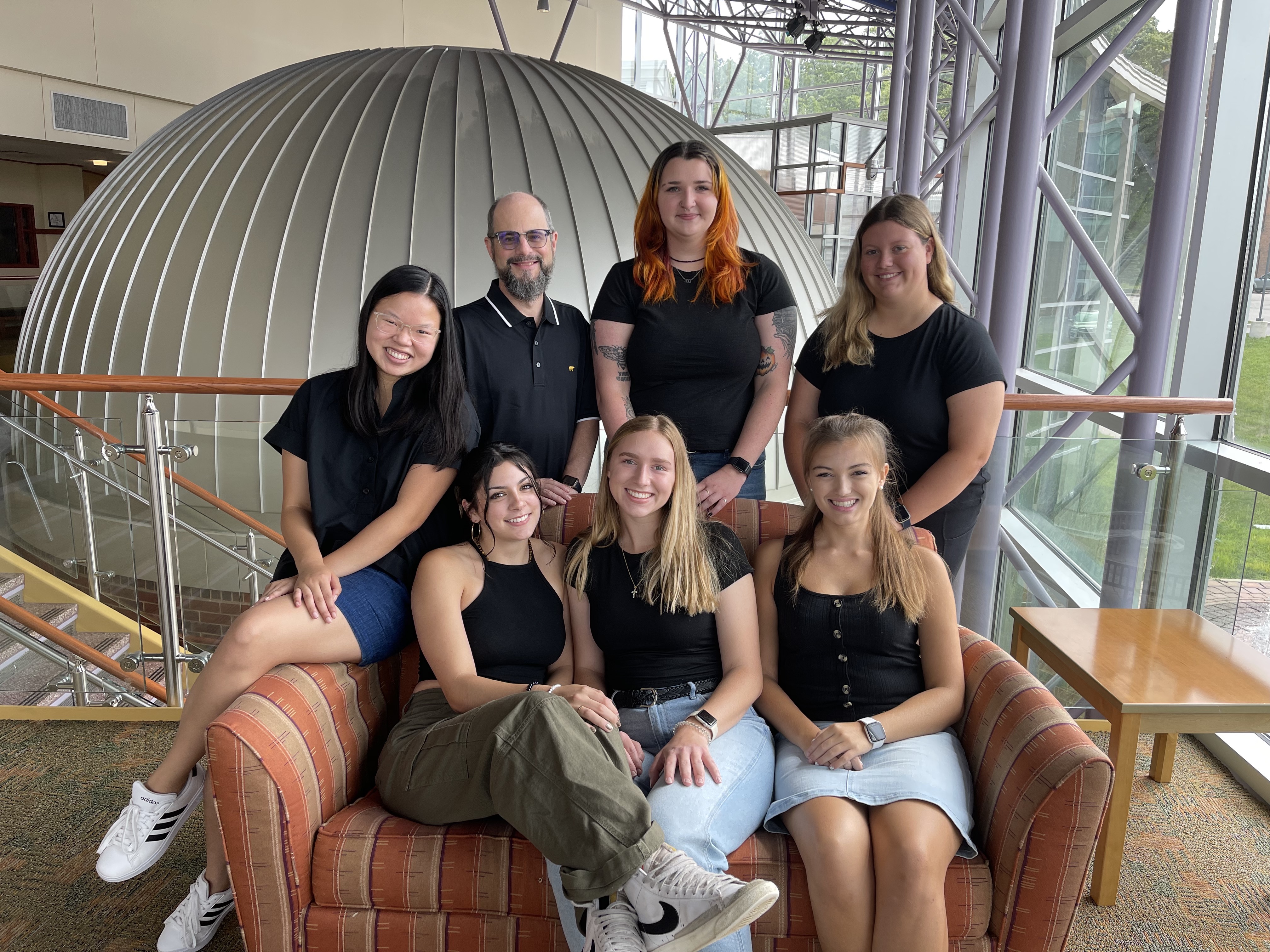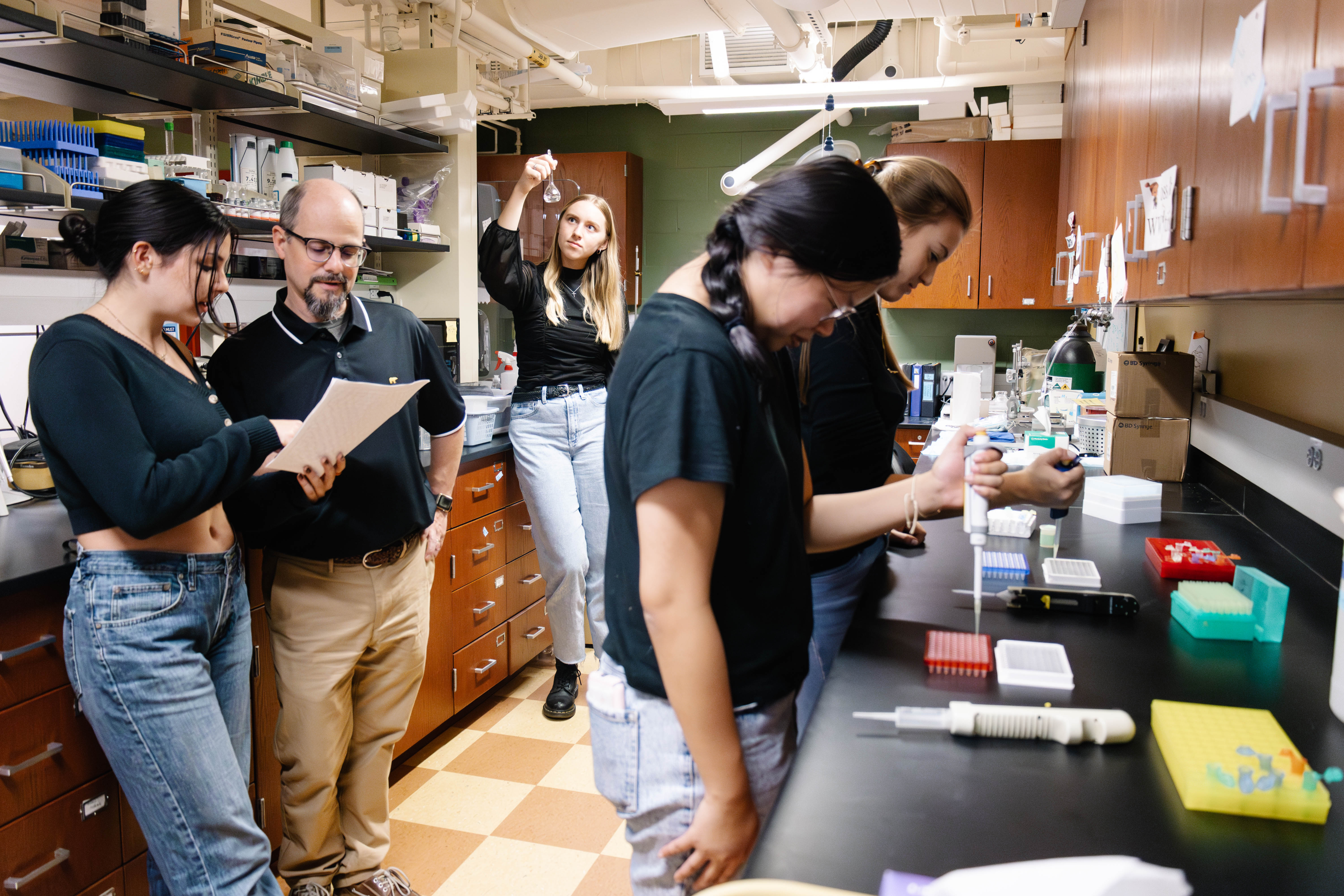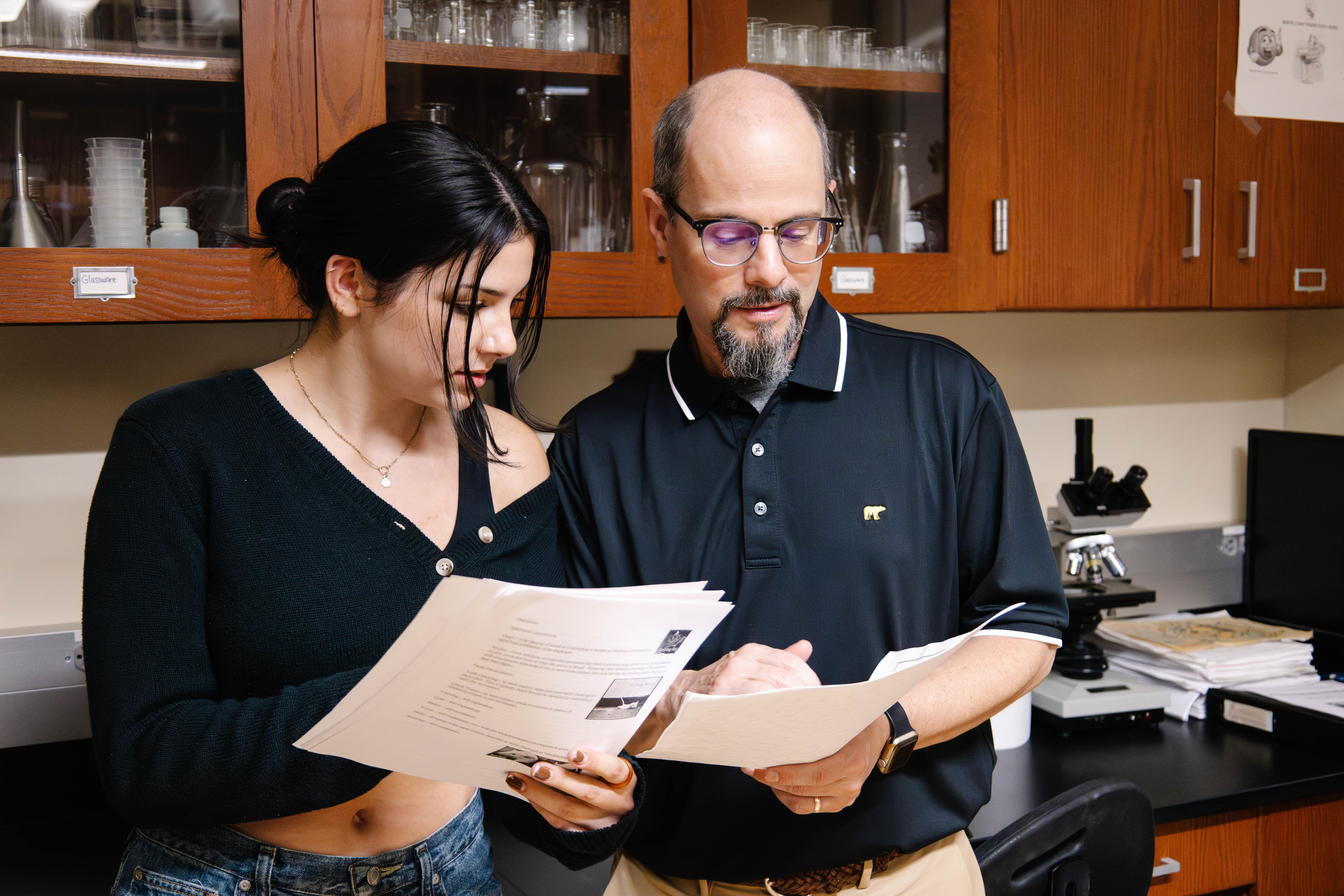SVC biology professor leads study of connection between alcohol and nicotine addictions
SVC biology professor leads study of connection between alcohol and nicotine addictions
-
Side Navigation
- Saint Vincent College to partner with West Penn Power Sustainable Energy Fund to bring solar-powered charging station to campus
- Verostko Center announces new exhibition featuring members of Associated Artists of Pittsburgh
- Saint Vincent College to celebrate Life in Christ Week
- December SVC grad commissioned as army officer
- SVC APB wins regional award for record fifth year in a row
- Student spotlight: Bridgette Gorg
- The European Journal of Physics accepts latest work by SVC emeritus professor
- SVC theology professor to present talk on women in the Bible
- SVC biology professor leads study of connection between alcohol and nicotine addictions
- New Bachelor of Science in “Aviation Management – Professional Pilot” takes flight at Saint Vincent College
- SVC students’ documentary “Don’t Count Us Out” wins Gold Viddy Award
- Somerset Trust donates to Saint Vincent Small Business Development Center
- National top-10 ranking for Saint Vincent’s M.S. in Criminology program
- Fall 2023 Dean's List
- SVC’s Monastery Run Improvement Project significantly improves water quality along Four Mile Run
- Saint Vincent College theology professor’s book takes a deeper look at Laudato Si’
- Alumni spotlight: Charles Farley inducted into a pair of high school coaching halls of fame
- SVC Announces 2024 Wimmer Scholarship Award recipients
- Alumni spotlight: At work and at home, Aubrey Marquis is driven by philanthropy
- SVC extends deadline for financial aid filing, Bearcat Advantage Program to May 1
- The SVC Players to present “The Sound of Music” Feb. 22-25
- Alumni Spotlight: Cameron Klos
- Pittsburgh native Dr. Ruth Langer to speak at SVC’s annual Rabbi Jason Edelstein Lecture for Catholic-Jewish Dialogue
- SVC alumnus who authored “Masters of the Air” explains backstory of his book and the Apple TV+ series
- Four students participate in mock Supreme Court argument
- Alumni spotlight: Former FBI analyst Paul Hodos discusses “Steel City Mafia,” his second nonfiction book
- Alumni Spotlight: Anne Darla Pamphile
- The Latrobe/Greensburg Homeschool Science Fair returns
- Student spotlight: Alissa Minerd
- SVC panel discussion with Federated Hermes emphasizes data science’s role in asset management
- Alumni Spotlight: Brianna Baum
- Student Spotlight: Maci Rogers
- U.S. News & World Report ranks SVC’s MS in Management: Operational Excellence a top online master’s in business program for seventh straight year
- SVC professor’s internship program aims to help continue gradual cleanup of local waterways
- SVC Concert Series to present traditional Chinese woodwind program March 15
- Education honor society welcomes new members
- SVC men’s hockey team heads to D3 national tournament after winning league championship
- Student spotlight: Julie Zhu
- Fred Rogers Institute to host Community Open House
- Expert to speak at Saint Vincent about the ethics of keeping partly rehabilitated birds in captivity
- 2024 Challenge Program registration now open
- SVC math professor enjoys “reunion” in Italy at program for commutative algebra research
- SVC physics department will conduct solar eclipse program and planetarium shows
- Student spotlight: Luca Rosato
- Alumni Spotlight: Meg Matich awarded National Endowment for the Arts Literary Translation Fellowship
- SVC holds quantum computing workshop for local STEM teachers and students
- SVC to host women in business panel discussion
- SVC hosts successful Heart of Teaching conference
- Student spotlight: Austin Slye
- SVC physics researchers search for possible effects of solar eclipse on cosmic showers
- Saint Vincent to host annual Summer Theatre gala on April 12
- Saint Vincent College to host eclipse viewing event April 8
- Saint Vincent College earns silver, bronze honors in annual Educational Advertising Awards
- Student spotlight: J’Shawn Taylor
- SVC to host presentation about Catholic Rural Ministry
- Student spotlight: Jacqueline Moon
- SVC to host 2024 senior art showcase
- Saint Vincent College announces updated plans for new athletic center
- Antique coverlet exhibit will open April 17 at Saint Vincent College’s McCarl Gallery
- SVC education department to host educator and author Dr. Todd Whitaker
- SVC welcomes Sr. Gabriele Vasiliauskaité as inaugural Stephans Family Visiting Benedictine Professor
- Saint Vincent College announces Susan Baker Shipley as Spring 2024 Commencement speaker
- News
- Mr. Safin’s “From the Heart” captures filmmaking award
- Saint Vincent College extends new student commitment deadline to June 1
- SVC to host 21st annual Academic Conference
- SVC reveals finalists for 50th annual President’s Award
- SVC student will study in Wales as part of Fulbright Summer Institute program
- Saint Vincent College to build Rhodora and John Donahue Hall to house nursing program
- SVC Concert Series continues with “(S)Heroes” from the IonSound Project
- Saint Vincent College students, faculty recognized at 2024 Spring Honors Convocation
- Olivia Persin is named 2024 SVC President’s Award winner
- Dr. Sara Lindey receives Boniface Wimmer Faculty Award
- Dr. Lucas Briola receives Quentin Schaut Faculty Award
- Alumni spotlight: Chris Golias
- Attorney Daniel Lynch, C’89, delivers 2024 Spring Honors Convocation address
- Hiring event set for 2024 Steelers training camp at SVC
- SVC communication students query Bishop Zubik during mock press conference
- Auditor General Timothy DeFoor makes recruiting pitch to students during Saint Vincent College visit
- SVC students Cameron Walker and Lauren Brennan honored at Education Department’s annual senior send-off picnic
- ‘The Marvelous Wonderettes’ kicks off Saint Vincent Summer Theatre’s 2024 season
- SVC professor receives $200,000 grant from National Science Foundation to study water desalination
- Seven SVC students participate in mock Supreme Court arguments
- Saint Vincent College students win for best statistical analysis at DataFest competition
- Saint Vincent College holds 178th Spring Commencement
- Spring 2024 commencement address by Ms. Susan Baker Shipley
- SVC engineering students cap Spring 2024 semester by presenting wind tunnel projects
- SVC graduate Dominic Oto commissioned as Army officer
- SVC alumna Elizabeth Elin wins 2024 Clark Award for religious studies and theology
- SVC is recognized as a College of Distinction
- SVC’s Dr. Tim Kelly quoted by The Associated Press
- 2024 SVC Challenge Program registration ends May 31
- SVC Birding Team participates in World Series of Birding
- Alumni spotlight: Matt Bertone
- Trip to Portugal provided SVC students and alumni with global perspective
- Saint Vincent Summer Theatre offers special trolley trip for “Unnecessary Farce”
- SVC McKenna School dean and adjunct professor honored by Boy Scouts with Trailblazer Awards
- Digital art pioneer Roman Verostko, 94, dies
- Saint Vincent College ranked among top 10 Pennsylvania colleges in 19 degree programs
- SVC President Fr. Paul Taylor listed among 2024 Trailblazers in Higher Education
- Rev. Dr. Clarence E. Wright named inaugural Fred Rogers Fellow
- Dr. Mary Regina Boland quoted by Catholic News Agency
- Student spotlight: Natalie Homison
- Dr. Mary Beth Yount chosen to fill SVC’s Irene S. Taylor Endowed Chair for Catholic and Family Studies
- 35th annual Saint Vincent College Week brings 41 Crossroads Foundation scholars to campus
- 200 campers work up a sweat during annual Steelers Youth Football Camp at Saint Vincent College
- SVC’s cybersecurity program ranked No. 3 in the country
- 43 Saint Vincent College graduates begin pursuits of advanced degrees
- Student spotlight: Marta Trembetska
- SVC chemistry professor authors chapter about scholarship of teaching and learning for STEM faculty
- Saint Vincent College honors its 2024 Alumni of Distinction
- Saint Vincent Summer Theatre’s trolley event a success
- Archabbot Rev. Martin de Porres Bartel asks ‘Where are you, America?’ in TribLive editorial
- SVC hosts computer science camp for 26 students from Young Men and Women in Charge Foundation
- Saint Vincent College professor Dr. Lucas Briola to speak about Laudato Si’
- Holy multiples! SVC professor studies occurrence of twins and triplets among canonized saints
- Alumni spotlight: Kyla Hockley
- Saint Vincent College receives approval for Direct Entry Master of Science in Nursing program
- Spring 2024 Dean’s List
- SVC hosts annual Next One Up summer camp
- Professor tends to red maple trees along Saint Vincent College’s driveway entrance
- SVC student Maggie Shero and alumna Victoria Saddler earn grand champion laurels in equestrian competition
- Alumni spotlight: Chelsea Bayko
- Saint Vincent professor’s ‘Office Hours’ TV show promotes student and professional filmmakers from across the region
- DP Harris named Saint Vincent College’s director of athletics
- Saint Vincent College earns spot on Money’s Best Colleges in America 2024 list
- Student spotlight: Valeria Hurtado
- Phineas Gage to perform free concert in Latrobe
- Fr. Justin Matro to speak at Saint Vincent Seminary as part of Benedictine spirituality series
- SVC senior legal counsel Bruce Antkowiak interviewed for documentary series ‘The Godfather of Fentanyl’
- Tradition, hospitality shine through as Steelers wrap up 2024 training camp at Saint Vincent College
- Ready to roll: Tesla joins Saint Vincent’s fleet of vehicles
- Strong turnout for Phineas Gage concert in Latrobe
- Alumni spotlight: Mandi Freger
- Saint Vincent named a College of Distinction for 2024-25
- Two exhibitions to open at Verostko Center
- Saint Vincent College hires seven faculty for 2024-25 academic year
- Saint Vincent to host performance of Chamber Orchestra of Pittsburgh and soloist Chantal Braziel, C’15
- Saint Vincent College to host forum about election process and ballot security
- Saint Vincent College physics and chemistry professors collaborate on groundbreaking research project
- McCarl Coverlet Gallery set to open ‘Flights of Fancy’ exhibit
- News
- SVC student Julien Vonovier helps coach Switzerland to bronze medal at FIBA EuroBasket 2024
- ‘Parisian Pairings’ dinner set for Oct. 9
- Four Saint Vincent College degree programs ranked No. 1 in the state by College Raptor
- Blood drives set for Sept. 18 and 19 at Saint Vincent College
- Student spotlight: Anna Taylor
- Music at Midday returns to Saint Vincent College
- Tom Cocchi, C’13, becomes president of Saint Vincent College Alumni Council
- SVC professor chosen as Memorial Foundation for Jewish Culture fellow
- Saint Vincent College selected to participate in inaugural Institute on AI, Pedagogy and the Curriculum
- Saint Vincent College rises on U.S. News & World Report Best Colleges Rankings
- Students and faculty from San Beda University in Philippines make weeklong visit to Saint Vincent College
- Gregg Brandt and Halcyon Voices featured in Saint Vincent College Concert Series
- Faculty spotlight: Marti Fusco
- Saint Vincent College reveals its 2024 Athletics Hall of Fame class
- SVC law professor quoted in Associated Press story about inmate’s 4-decade appeals process
- Saint Vincent College secures $370,000 grant from National Science Foundation
- Alumni spotlight: Chaz Coleman, C’12
- Saint Vincent College hosts annual Homecoming Weekend, announces Homecoming Queen and King
- Next Benedictine spirituality series event focuses on the Eucharist
- Saint Vincent College, Independence Health System collaborate to encourage healthcare careers
- Saint Vincent College filmmakers have scary good time in Pittsburgh 48-Hour Film Project competition
- Alumni spotlight: Delaney Fox, C’24
- Saint Vincent College cybersecurity and criminology programs earn national rankings from Intelligent.com
- Saint Vincent College’s nursing program awarded ‘most valuable’ national ranking
- SVC data science professor studies relationship between fracking chemicals and birth outcomes
- Dr. Matthew Ramage to give annual Pope Benedict XVI Lecture at Saint Vincent Seminary
- Student spotlight: Brandon Karafilis
- Saint Vincent College ranked No. 78 nationally by WalletHub
- Saint Vincent College awarded grant from Appalachian Regional Commission to boost nursing program
- Saint Vincent College secures federal grant to increase access to study-abroad and foreign language programs
- Dr. Mary Boys to speak on ‘recovering the Jewish Jesus’ in Rabbi Edelstein lecture at Saint Vincent College
- ‘Winter Sky’ and ‘Star of Bethlehem’ shows set for Saint Vincent College planetarium
- SVC Players to present ‘Pride and Prejudice’
- State trooper Trey Parsley, C’14, to speak at annual Blue Mass at Saint Vincent Archabbey Basilica
- Student spotlight: Gabbie Milcoff
- Saint Vincent College’s annual mock trial event draws 30 students from local high schools
- Prayer requests for deceased to be offered during All Souls Mass in student chapel
- Judge Mary McGinley to speak at Saint Vincent College’s Winter 2024 Commencement
- Saint Vincent College team advances to semifinals at national moot court competition
- Student spotlight: Coty Walters
- SVC History Department will mark 80th anniversary of SS Léopoldville disaster with lecture and display
- Saint Vincent College to honor former wrestling coach Tom Harbert with mat dedication at Nov. 12 season-opening dual meet
- Decline in drug use proves impact of SVC Prevention Projects
- Two students in new aviation program fly solo for the first time
- Student spotlight: Sarah Hartner
- Faculty spotlight: Father Pachomius Okogie, O.S.B.
- Saint Vincent College holds Fall Honors Convocation as part of annual Founders’ Day celebration
- Alumni spotlight: Albert Ciuksza, C’02
- Sister Nicole Kunze, O.S.B., delivers Founders’ Day reflection
- Dr. Eric Kocian receives 2024 Thoburn Excellence in Teaching Award
- SVC Wraps for Kids delivers magic of Christmas to local children
- Dr. Helen Burns receives 2024 Projektenmacher Award
- The SVC Players to present “The Sound of Music” Feb. 22-25
- Saint Vincent College law professor quoted by The Associated Press
- Alumni spotlight: Sydney Green, C’22
- Saint Vincent College hosts Society of Catholic Social Scientists conference
- Saint Vincent College earns high marks from The Heritage Foundation and Washington Monthly
- Communication Students Query Bishop Zubik in Mock Press Conference
- Faculty spotlight: Father Isaac Haywiser, C’09, S’15
- Saint Vincent College holds 20th Winter Commencement
- Saint Vincent College Winter 2024 Commencement address by Hon. Mary C. McGinley
- Saint Vincent College to offer new mathematics/actuarial science program
- McCarl Coverlet Gallery exhibit featured in Colonial Coverlet Guild of America newsletter
- Alumni spotlight: Aileen Mooney, C’11
- SVC grads' health profession school acceptance rates outpace national averages
LATROBE, PA — Associate professor of biology Dr. Michael Rhodes and five Saint Vincent College (SVC) students spent six weeks last summer serving nicotine and beer to mice. It wasn’t merely happy hour for a bunch of lab mice. The data from this research project might foster a better understanding of nicotine and alcohol addictions in humans. 
The student group consisted of Mei Jenkins-Andrews C 24, Celia Monroy C 25, Julianna Lott C 25, Victoria Sarver C 25 and Stefanie Livelsberger C 25. Also helping was Sara Bollinger, a student at River Valley High School, whose mom is SVC senior lecturer of chemistry Beth Bollinger.
In humans, there is a high rate of co-occurrence between alcohol and nicotine addictions. The students studied how nicotine injections and nicotine withdrawal affected the mice’s alcohol consumption and stress hormone concentrations.
“We want, hopefully, to see some sort of correlation between alcohol and nicotine [consumption] and how people often abuse those two substances together,” Sarver said. “We're hoping that's the same with the mice. So, when we withdrawal [the substances from the mice], we hope it will lead to some sort of change in their behavior.”
The mice’s daily beer consumption per body weight was comparable to, or in some cases greater than, that of human alcoholics. After receiving daily nicotine injections for two weeks, the mice began withdrawing from nicotine. Behaviors were assessed with swim tests and marble burying tests.

“For a while, I had some hang-ups about using mice [with] nicotine and alcohol,” Monroy said. “I felt bad for them. But now I see how much research we're getting out of this project, what the data and the trends look like, and it's becoming really interesting. We can say, ‘Oh, wow, this is correlated by science and data, and we can use this going forward in other projects.’”
Lott is interested in animal behavior and plans to apply to veterinary school, so she was keen to join Dr. Rhodes’ internship group. “I wanted to get as much animal experience and research experience as I could, especially because I'll be working with a variety of animals,” Lott said.
“This project aligned with my [psychology] minor and pre-med [track] because I’m trying to see how people try to quit addictions,” said Jenkins-Andrews, a biology major.
This spring, the team will dive into its data analysis. According to Dr. Rhodes, initial results suggest that mice who were experiencing withdrawal from nicotine had increased depressive behaviors and may have consumed more beer than the control mice.

“It also appears there were interesting sex differences in the depressive behaviors, with male animals showing more depressive behaviors than female animals during the withdrawal period,” Dr. Rhodes said. “We will need to correlate the anxiety and depressive behaviors with the amount of alcohol consumed to determine if any interesting patterns emerge.”
Dr. Rhodes hopes to present the project’s conclusions at the annual Society for Neuroscience convention in 2024 in Chicago or in 2025 in San Diego. The students who were fully invested in the project will be invited to attend and participate in the presentation.
PHOTOS: Dr. Michael Rhodes and his research group
